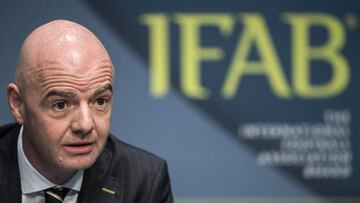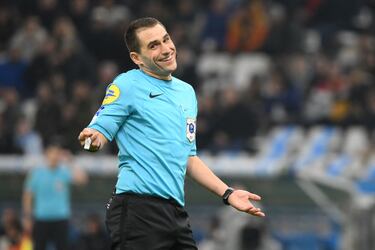The latest IFAB revolution: timed football
The IFAB Annual Meeting is to be held this Wednesday in London and will address the problem of time-wasting.

The IFAB celebrates this Wednesday an interesting Annual Meeting in London to address some of the changes in the regulations that can improve football. The most interesting point is 3.B, which refers to the problem generated by the loss of playing time. Replacing the current clock with a stopped clock, in a basketball-style change, is one of the revolutionary proposals that will be presented.
Although it sounds almost utopian (is Gianni Infantino involved?), there are many people who ask that playing time be stopped every time the ball is not in play. It is not, in fact, the first time that a debate of this magnitude has arisen. The IFAB is no stranger to this and will now discuss it.

Time-wasting at the World Cup
At the World Cup, FIFA, through its refereeing director, Pierluigi Collina, said that the loss of effective time was a matter of concern to those responsible for football. The measure taken by officials was to extend the duration of each match half to recover the time lost. In this way, games would go well over the common durations, much longer than usual, something that both surprised and raised doubts at the same time.
The IFAB, the body in charge of the changes in the official regulations, know that the problem of the loss of effective game is on the table. That is why they will have an initial consultation between the parties involved to find out which direction to go. According to the Times, there are three proposals being considered: increasing stoppage times, as was done in Qatar, maintaining the current method but improving it and, the most revolutionary of all, introducing the stopped clock to replace the running watch.
After 10 matches, Opta has tallied "playing time" in what are ostensibly 90-minute football matches in la Liga.
— total Barça (@totalBarca) October 26, 2021
Incredibly, Valencia routinely waste almost an entire half! And the rest of the teams are not much better. pic.twitter.com/zXJWpMJiDQ
The stopped clock would not be used all the time
Related stories
This third option has been proposed by former Arsenal vice president David Dein, ambassador of the FA and the Premier League. “I am not saying that the clock should be stopped every time the ball goes out, but instead for the things that cause the most delays: goal celebrations, substitutions, penalties, injuries and VAR,” he explained in the Times. This Wednesday will be the first consultation on the matter. The March AGM would have to authorise a trial of the new rule, and since it would be such a significant change, it would take a minimum of two years before it could be implemented worldwide if the change were to be deemed a success.
You may also like:
- Erling Haaland talks Benzema, Madrid, sleeping and God
- Garnacho rejects Manchester United offer, prefers Madrid
- The most creative players in Europe - not who you would expect!
- Marcelo Bielsa is the favourite to take over Mexican football team


